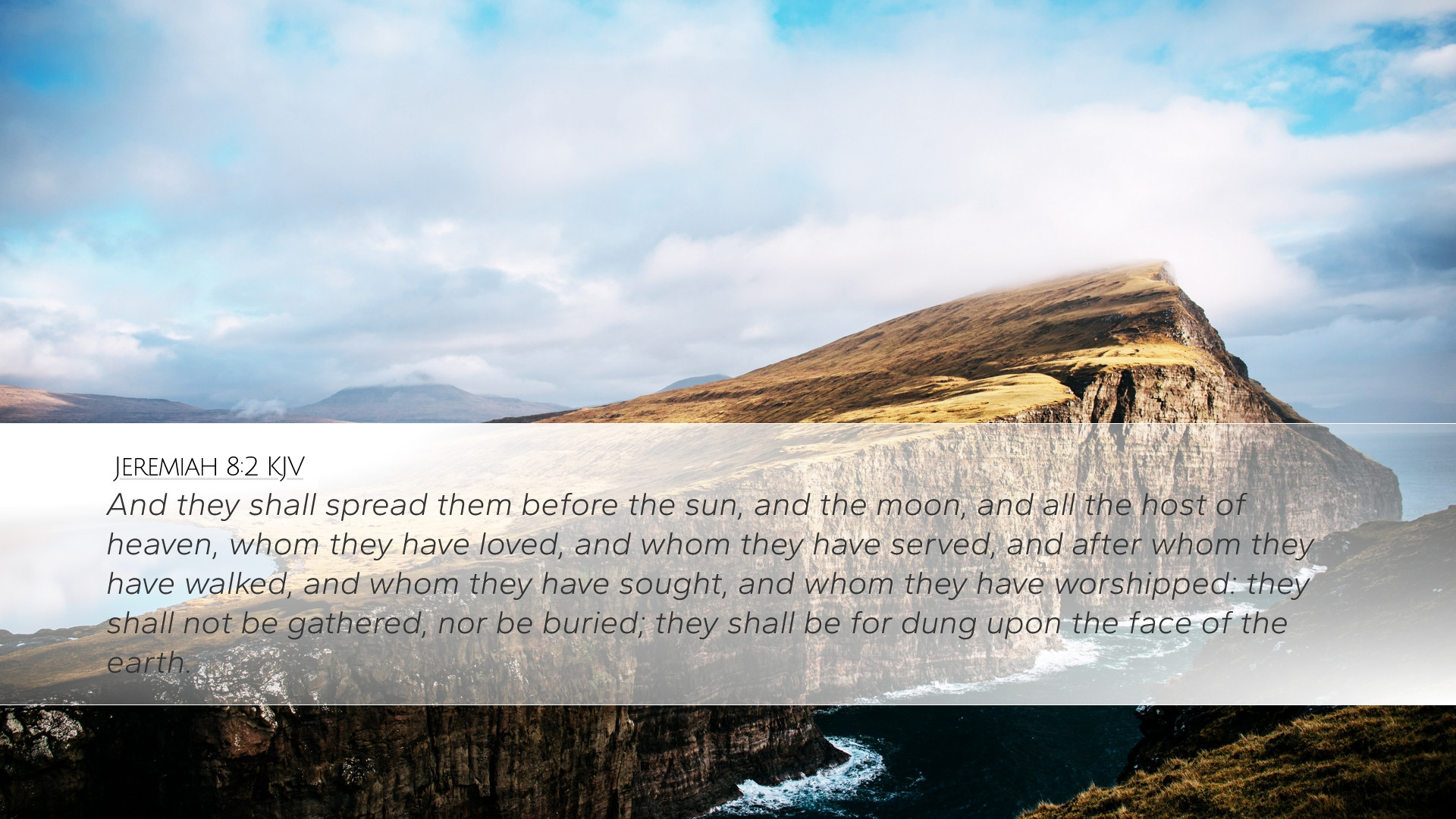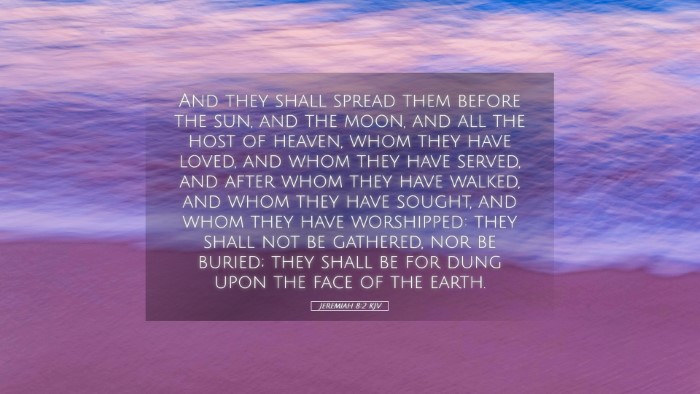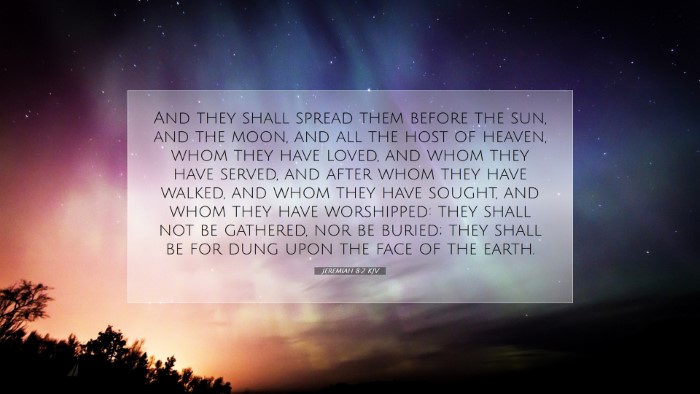Commentary on Jeremiah 8:2
Jeremiah 8:2 states, "And they shall spread them before the sun, and the moon, and all the host of heaven, whom they have loved, and whom they have served, and after whom they have walked, and whom they have sought, and whom they have worshipped: they shall not be gathered, nor be buried; they shall be for dung upon the face of the earth." This profound passage encapsulates the dire consequences of idolatry and rejection of God, presenting a vivid image of divine judgment.
Context and Background
The Book of Jeremiah is set against the backdrop of Judah's impending exile due to persistent sin and rebellion against God. Jeremiah, known as the weeping prophet, communicates God's message of judgment but also the call to repentance. Chapter 8 specifically highlights the consequences of forsaking God for false idols.
Insights from Public Domain Commentaries
Matthew Henry's Commentary
Matthew Henry emphasizes the seriousness of the people’s apostasy, noting that the act of spreading the bones of the dead before the celestial bodies symbolizes an ultimate dishonor to God. He explains that this desecration reflects the people's misplaced affections:
- Idolatry Exposed: The verse reveals how they had turned to the hosts of heaven, worshipping celestial bodies rather than the Creator. Henry asserts that this serves as an indictment against the worship of false gods.
- Consequences of Sin: He comments on the inevitable result of such rebellion, where the dead would not receive a proper burial—a sign of judgment indicating that God’s wrath has rendered them dishonored.
- Spiritual Decadence: The lamentation of Jeremiah reflects a deep sorrow for the state of the people, who are futility chasing after idols and neglecting the true God.
Albert Barnes' Notes on the Bible
Albert Barnes provides a deeper exegesis on the implications of the actions described in this verse. He interprets the spreading of bones as:
- Public Display of Defilement: Barnes notes that the act signifies a public disgrace, where the very bodies that should have been respected are left in the open, showing the total disregard for life and death precipitated by sin.
- Symbol of Judgment: He connects this image to the broader themes of judgment in the Old Testament, where God allows the consequences of idolatry to manifest in physical realities—here, as a lack of burial.
- Remnant and Restoration: While the passage speaks of doom, Barnes also points to the hope of restoration that is rooted in repentance, suggesting that God’s covenant remains, even in judgment.
Adam Clarke's Commentary
Adam Clarke offers a valuable cultural context to the passage, elucidating the practices of ancient Judah:
- Customs of Burial: Clarke elaborates on the importance of burial customs in Jewish culture, stating that leaving bodies unburied was considered a significant curse and a sign of God’s displeasure.
- Moral Decline: He identifies the idolatry mentioned in the verse as symptomatic of a deeper moral decline and a collective turning away from God’s ways.
- Call to Reflection: Clarke’s interpretation urges contemporary readers to reflect on their own lives and the idols that compete for their devotion, recognizing the stark warnings Jeremiah conveys.
Theological Significance
The theological implications of Jeremiah 8:2 resonate through various themes found throughout Scripture:
- Idolatry: This verse serves as a stark reminder of the severity of idolatry. By placing their hope in celestial bodies, the people demonstrate their practical atheism and abandonment of God’s covenant.
- Divine Judgment: The promise of judgment is consistent in the prophetic literature, illustrating that God’s holiness demands accountability for sin.
- Hope and Restoration: Despite the somber nature of this passage, it paves the way for understanding God's grace. Repentance remains a vital theme, offering hope for redemption even amid judgment.
Application for Today
For pastors, theologians, and students of the Word, Jeremiah 8:2 is a powerful catalyst for reflection and discussion:
- Self-Examination: Individuals are called to examine their hearts for any form of idolatry. What modern-day practices or attractions might be overshadowing their relationship with God?
- Teaching on Idolatry: It is essential for church leaders to address the concept of idolatry, helping congregants understand that anything that takes priority over God can lead to spiritual ruin.
- Encouragement Toward Repentance: Jeremiah’s message encourages believers to seek God’s mercy and restoration, emphasizing that His grace is always accessible to the repentant heart.
Conclusion
In summary, Jeremiah 8:2 serves as a cautionary tale against idolatry and a profound reminder of the consequences of turning away from God. As we engage deeply with this text, we are invited to reflect on our own spiritual lives and ensure that we remain steadfast in our worship of the true God, avoiding the pitfalls of misplaced affections.


